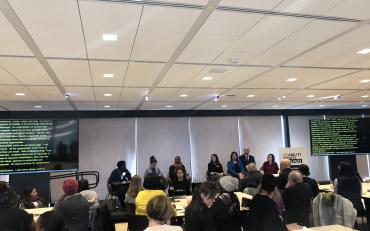On 12 March 2019, the International Disability Alliance participated in a panel: “Centralizing Women with Disabilities in Feminist Discourse, Funding and Programming”, in the margins of the 63rd session of the Commission on the Status of Women. The panel aimed to promote collaboration between women’s rights donors and women with disabilities. The event featured a panel of five women women from both donor and civil society organizations who engaged in a dialogue with the goal of better understanding the priorities of women with disabilities and the ways funders can further prioritize inclusion within their work.
- More information on the sixty-third session of the Commission on the Status of Women.
Highlight quotes from the panel include:
- Lu Han: “A lot of women start work from being a foot soldier in a larger disability rights context, a lot of the time they feel they are designing projects on specific needs of women with disabilities. But their vice is not really heard. And they’re not sitting at the decision making table with the male activists in the room. These women are struggling but also contributing ideas to DPOs (organizations for persons with disabilities) and a larger disability movement.”
- Robinah: (on the stigma of being a woman with a psychosocial disability) “Stigma is something that brings a lot of exclusion. It brings discrimination, isolation, judgement. You are judged. Then you are given no choice. You cannot make your own choices and then you are not taken seriously, even when you are talking about serious things. We (women with disabilities) have to be involved at all levels. Full, active, effective participation."
- Myroslava: “I think that what is interesting to see about working with women with disabilities within a disability rights field is that I think it helps us to get closer to the diversity and intersecting issues in disability. In much of the work we are seeing guided and led by women with disabilities at national and grass roots levels, they are able to reach across barriers and address more immediate and pressing issues. This trickles up to the international level as well.”
- Jigid Dulamsuren, IDA representative “without funding I wouldn't be able to be here. It’s through the funding from WFD and IDA that enables me to participate in events like this. Without sign language interpretation, I’m not able to access any kind of projects or events like this (panel). The regime for disabled people around the world around the world places disabled women behind women who don’t have disabilities. The application process for funding is the same for people with and without disabilities. So getting access to funding is particularly difficult for people with disabilities because they have barriers to access education and cannot access the language that is required to secure funding from donors.”

